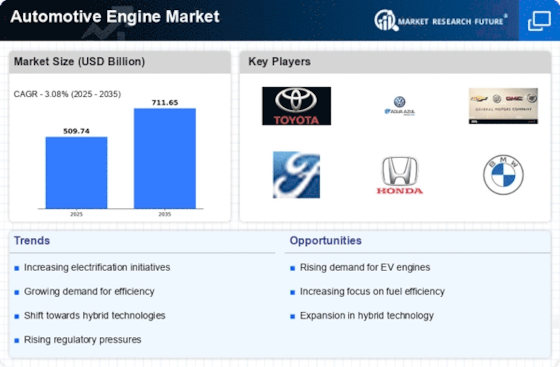Market Analysis
In-depth Analysis of Automotive Engine Market Industry Landscape
The automotive engine market is a rapidly evolving and dynamic domain that plays a crucial role in the global automotive industry. A few factors shape the car industry for manufacturers, suppliers, and consumers alike by adding to its market aspects. Mechanical headways are one of the key factors influencing market elements in the automobile engine industry. The automotive industry is undergoing a significant shift towards more charge and maintainability, which has led to a persistent demand for motor advancements that are more efficient and environmentally benign. Manufacturers are working hard to develop novel solutions to create powerful, environmentally friendly motors that emit fewer pollutants. Due to this technological push, electric and hybrid motors have become more popular, challenging the conventional reliability of gas-powered engines. Severe discharge regulations are being enforced by state-run administrations to mitigate environmental concerns and reduce the carbon footprint of automobiles. This compelled automakers to invest in cleaner technologies and develop motors that follow these regulations. As a result, the industry is witnessing a move toward greener alternatives, which is affecting the strategies of established firms as well as recent entrants. Consumer preferences and market trends are additional variables that significantly impact the components of the automotive industry. Interest in electric and hybrid vehicles is growing as consumers become more conscious of environmental issues and eco-friendliness. Because of this pattern, automakers and innovation groups have teamed together and formed organizations to stay competitive in the emerging industry. Parts and raw material suppliers play a crucial role in determining the cost, quality, and availability of automobile motors. Any disruptions to the chain of stores, whether due to global problems, calamitous incidents, or other unforeseen circumstances, have the potential to have a substantial impact on the entire automobile sector. Manufacturers must maintain flexible and adaptive supply chains to identify weaknesses and provide a steady supply chain of components for motor manufacturing. Manufacturers should stay swift, welcome change, and adapt their equipment to the growing demand for reliable and efficient automobile engines as the industry continues to grow. This striking scenario highlights the two challenges and opens opportunities, demonstrating how adaptability and foresight are crucial for success in the dynamic car industry.


















Leave a Comment